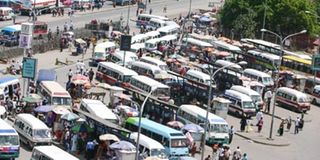Sumatra reverses directive on city transport companies

Commuter buses at Dar es Salaam’s Ubungo bus stand. A plan to turn operators of these buses into transport companies by July 2013 has failed. PHOTO | FILE
What you need to know:
The Surface and Marine Transport Regulatory Authority (Sumatra) has rescinded its decision to license only operators that have been registered as companies.
Dar es Salaam. The deadline for instituting a new system to guide commuter bus operations in Dar es Salaam has hit a snag.
The Surface and Marine Transport Regulatory Authority (Sumatra) has rescinded its decision to license only operators that have been registered as companies.
Sumatra issued a directive earlier this year that by July 2013, only commuter bus operators who would have formed transport companies would be licensed to operate on Dar es Salaam routes.
However, Sumatra has reversed the directive after stakeholders failed to agree on how to form and run companies efficiently.
Sumatra public relations manager David Mziray told BusinessWeek last week, that the directive faced complications for a number of reasons including the conflict of interests between government officials who own commuter buses popularly known as daladala and other operators.
“There is also the lack of sound business skills to run transport companies,” he said.
As a result, Sumatra has decided to implement the directive into phases.
Phase one will start after an analysis of a tender floated in May this year for procurement of companies to run commuter bus services on Bagamoyo and Kilwa roads.
Sumatra had invited sealed bids from eligible transport companies to provide commuter bus services in Dar es Salaam City using the routes in two lots. Lot No.1 involves Ali Hassan Mwinyi Road: Tegeta to Posta, Tegeta – Kivukoni, Msasani to Posta, Masaki to Posta, Tegeta via Africana via Kawe/Mbezi Chini to Posta.
Lot No. 2 is Kilwa Road: Mbagala Rangi Tatu to Kariakoo, Mbagala Rangi Tatu to Posta, Mbagala Rangi Tatu to Stesheni, Mbagala Rangi Tatu to Temeke, Mbagala Rangi Tatu to Gongo la Mboto, Mbagala Rangi Tatu to Buguruni and Mbagala Rangi Tatu to Ubungo.
A plan for modernising commuter transport under Dar es Salaam Rapid Bus Transport (Dart) is still intact. A pilot project for instituting companies will start next year.
“The pilot project for using companies to offer rapid commuter bus services will start next year. The project is expected to take off in 2016,” said Mr Mziray.
However, some stakeholders are unimpressed. “Sumatra’s decision to reverse its own directive shows that there is politics. The authority has to enforce directives to make things happen as they are planned,” commented a private consultant for transport business operations, Mr Gilbert Komba.
In recent months Sumatra has been convening meetings of stakeholders to discuss the need for forming transport companies but nothing substantial has come out of them.
Meanwhile, the Simon Group which owns Uda has said it will revamp Dar es Salaam commuter bus services if the government meets its requests. Group executive chairman Robert Kisena said those involve having plots for parking buses in various stations.
“It is uneconomical to run commuter bus services using a single parking station. We have proposed that each major route have a space for parking buses to avoid additional costs of transporting buses without passengers.”
He added: “Those involved in commuter bus services in Dar es Salaam must bear in mind that under the 1974 Act of Parliament, Uda has legal rights to run commuter bus transport in the city. Other players are supposed to complement our services.”
Under Dart, the Dar es Salaam City Council is implementing a project for instituting Bus Rapid Transport system to improve commuter business services.
The project’s director of systems and management, Mr John Shauri, told journalists that the private sector was expected to contribute Sh160 billion ($100 million) for purchasing buses and establishing a modern ticketing system.
With a weak private sector there is huge task to mobilise funds for accomplishing the project, according to experts.
The project is divided into six phases which will involve Morogoro, Kawawa, Msimbazi and Kivukoni roads in the first phase; Kilwa, Kawawa roads in the second phase; Nyerere, Uhuru, Bibi Titi and Azikiwe roads in the third phase; Bagamoyo and Sam Nujoma roads in the fourth phase; Mandela and new roads to be built in the fifth phase. Old Bagamoyo Road and two new roads will be built in the sixth phase. All these roads to be constructed have a total length of 130.3km, according to Dart.
According to Dart, daladala serve public transport in the city. There are about 9,000 such buses, each with the capacity to carry 16 and 35 passengers.
The current total demand for quality buses in the city is estimated to be at least 10,000 a day, according to Dart findings.
The service offered is poor due to overloading and overcrowding in buses particularly during peak hours, reckless driving, harassment of women and schoolchildren, pollution and substandard of vehicles and traffic jams on most roads in the city.




